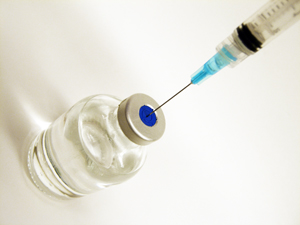GnRH Agonists for Fertility Preservation?
| How Does GnRHa work? |
Data is limited about the efficacy of GnRHa to prevent diminished ovarian reserve or ovarian failure. The mechanism by which this treatment might prevent premature menopause is unclear – some theories include the decrease in ovarian perfusion, the suppression of pituitary FSH, and the activation of GnRH receptors. |
| Prior Studies about GnRHa and ovarian reserve: |
- Initial data from observational trials has suggested that suppression of ovarian function during chemotherapy can offer some protection of ovarian reserve, compared to historic controls. However, this observational, retrospective study design lends itself to many type of bias. Most significantly, the controls and subjects are likely a different type of patient population.
 There have been a few randomized-controlled trials, with varying results. The largest trial was recently published in JAMA by Del Maestro et al1. This was a parallel, randomized, open-label superiority trial of Triptorelin for premenopausal women with breast cancer, planning chemotherapy. There have been a few randomized-controlled trials, with varying results. The largest trial was recently published in JAMA by Del Maestro et al1. This was a parallel, randomized, open-label superiority trial of Triptorelin for premenopausal women with breast cancer, planning chemotherapy.
- 281 women were randomized, and 12 months after their last dose of chemotherapy, the rate of early menopause was 25.9% in the women with chemotherapy alone, versus 9.8% in the chemotherapy plus Triptorelin group, for an absolute difference of -17%.
- Limitations:
- Their primary outcome was premature menopause at 12 months follow-up. This doesn’t address the large subset of women who resume cycling, but have “diminished ovarian reserve’ and will have difficulty conceiving. The authors plan to follow these women prospectively, but the outcome of premature menopause is very different from fertility.
- Women on tamoxifen who did have resumption of menses were placed on Triptorelin for 2 years. It is not clear from the paper how they could assess premature menopause at 12 months if these women were on Triptorelin. Also, it is not clear how many women were in this situation, but it this could definitely skew results, especially if the prolonged use of Triptorelin differed between the two groups.
- Many of the women in the study were older (1/3 were 41-45). In this age group, avoiding menopause may be a reasonable goal, but preserving fertility is likely not the main objective. On the other hand, future fertility may be a more important outcome for younger women. Unfortunately, they did not do a subgroup analysis by age.
- Triptorelin was well-tolerated, and did show benefit overall. We However, one concern would be if younger women may view this as a guarantee of preserved ovarian function (which it definitely is not), and therefore may not consider embryo/egg cryopreservation as seriously.
- There are 4 other smaller randomized-controlled trials that evaluated the role of GnRH analogues to preserve ovarian function during chemotherapy.
- Badawy et al. studied 78 women with breast cancer, age 18-40, and found that using goserelin during chemotherapy reduced the rate of premature menopause from 67% to 11%2.
- Gerber et al. looked at 60 women with breast cancer found a slight benefit of goserelin use, though it was not statistically significant, and the women were only followed for 6 months3.
- Leonard et al. presented preliminary results that found no difference in the rate of premature menopause in women who did, or did not, receive goserelin4.
- Finally, Ismail-Kahn et al. halted a randomized-controlled trial of breast cancer patients receiving triptorelin for lack of benefit after 49 women were enrolled5.
A systemic review and meta-analysis of 13 studies (3 randomized controlled trials and 10 non-randomized studies) showed that GnRH agonist treatment resulted in a higher likelihood of preserved ovarian function. However, when they limited the analysis to only randomized-controlled trials, there was no statistically significant difference6. |
References
1. Del Mastro L, Boni L, Michelotti A, et al. Effect of the gonadotropin-releasing hormone analogue triptorelin on the occurrence of chemotherapy-induced early menopause in premenopausal women with breast cancer: a randomized trial. JAMA. Jul 20 2011;306(3):269-276.
2. Badawy A, Elnashar A, El-Ashry M, Shahat M. Gonadotropin-releasing hormone agonists for prevention of chemotherapy-induced ovarian damage: prospective randomized study. Fertil Steril. Mar 2009;91(3):694-697.
3. Gerber B, von Minckwitz G, Stehle H, et al. Effect of luteinizing hormone-releasing hormone agonist on ovarian function after modern adjuvant breast cancer chemotherapy: the GBG 37 ZORO study. J Clin Oncol. Jun 10 2011;29(17):2334-2341.
4. Leonard RC AD, Anderson R. The OPTION trial of adjuvant ovarian protection by goserelin in adjuvant chemotherapy for early breast cancer. J Clin Oncol. 2010;28((supp)):15S.
5. Ismail-Khan R MS, Cox C. Preservation of ovarian function in young women treated with neoadjuvant chemotherapy for breast cancer: a randomized trial using the GnRH agonist triptoreline during chemotherapy [abstract]. J Clin Oncol. 2008((supp)):26.
6. Kim SS, Lee JR, Jee BC, et al. Use of hormonal protection for chemotherapy-induced gonadotoxicity. Clin Obstet Gynecol. Dec 2010;53(4):740-752.
About the Author
Jennifer Mersereau, MD, MSCI, is an reproductive endocrinologist in the University of North Carolina’s Department of Obstetrics and Gynecology. As the Director of the Fertility Preservation Program, she has extensive experience guiding patients and physicians through the oncofertility experience.
This page was last updated March 14, 2012.


 There have been a few randomized-controlled trials, with varying results. The largest trial was recently published in JAMA by Del Maestro et al
There have been a few randomized-controlled trials, with varying results. The largest trial was recently published in JAMA by Del Maestro et al